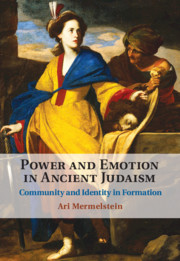Book contents
- Power and Emotion in Ancient Judaism
- Power and Emotion in Ancient Judaism
- Copyright page
- Dedication
- Contents
- Acknowledgments
- Abbreviations
- Introduction Power and Emotion in Ancient Judaism
- Part I Jewish Emotional Resistance to Gentile Power-Over in the Greco-Roman Diaspora
- Part II Jewish Emotion Discourse in Response to Divine Power-Over
- 4 Overcoming Divine Power-Over
- 5 Coping with Divine Power-Over
- Part III The Dead Sea Sect As Emotional Community
- Conclusion
- Bibliography
- Primary Source Index
- Modern Author Index
- Subject Index
5 - Coping with Divine Power-Over
Grief in 4 Ezra
from Part II - Jewish Emotion Discourse in Response to Divine Power-Over
Published online by Cambridge University Press: 04 June 2021
- Power and Emotion in Ancient Judaism
- Power and Emotion in Ancient Judaism
- Copyright page
- Dedication
- Contents
- Acknowledgments
- Abbreviations
- Introduction Power and Emotion in Ancient Judaism
- Part I Jewish Emotional Resistance to Gentile Power-Over in the Greco-Roman Diaspora
- Part II Jewish Emotion Discourse in Response to Divine Power-Over
- 4 Overcoming Divine Power-Over
- 5 Coping with Divine Power-Over
- Part III The Dead Sea Sect As Emotional Community
- Conclusion
- Bibliography
- Primary Source Index
- Modern Author Index
- Subject Index
Summary
As we saw in the previous chapter, emotions do not only reflect power relations but play an important role in producing them in the first place. In the case of ancient Judaism, emotions can empower when they reflect correct beliefs about God. Because emotions are bound up with cognition, religious emotion reflects religious belief, and, according to 1 Maccabees, God rewards with power-to those whose emotions are aligned with correct beliefs. In this chapter, I continue probing this aspect of religious emotion, but I do so in a theological context in which the empowering capacity of emotion is particularly important. The work I analyze here, 4 Ezra, a composition written in approximately 100 ce, highlights the empowering role of grief in response to the trauma generated by the destruction of the Temple in 70 ce. In contrast to the Hasmoneans in 1 Maccabees, Ezra does not succeed in overcoming divine power-over, the effect of which in the present time is irreversible, but his emotions enable him to cope with that form of power, restore his sense of agency, and teach him how to overcome divine power-over in the future. Exploring the emotional responses to the absolute powerlessness associated with trauma, and the empowering capacity of emotion to assist in coping with trauma, adds an essential dimension to understanding the relationship between power and emotion in general and in the case of ancient Judaism in particular.
- Type
- Chapter
- Information
- Power and Emotion in Ancient JudaismCommunity and Identity in Formation, pp. 132 - 150Publisher: Cambridge University PressPrint publication year: 2021



